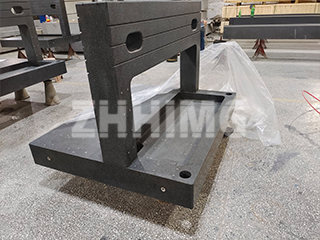Usage Precautions for Marble Surface Plates
-
Before Use
Ensure the marble surface plate is properly leveled. Wipe the working surface clean and dry using a soft cloth or a lint-free cloth with alcohol. Always keep the surface free from dust or debris to maintain measurement accuracy. -
Placing Workpieces
Gently place the workpiece on the plate to avoid impact damage that may cause deformation or reduce precision. -
Weight Limit
Never exceed the rated load capacity of the plate, as excessive weight can damage its structure and compromise flatness. -
Handling Workpieces
Handle all parts with care. Avoid dragging rough workpieces across the surface to prevent scratches or chipping. -
Temperature Adaptation
Allow the workpiece and measuring tools to rest on the plate for about 35 minutes before measurement so they can reach temperature equilibrium. -
After Use
Remove all workpieces after each use to prevent long-term load deformation. Clean the surface with a neutral cleaner and cover it with a protective cover. -
When Not in Use
Clean the plate and coat any exposed steel components with rust-preventive oil. Cover the plate with rust-proof paper and store it in its protective case. -
Environment
Place the plate in a vibration-free, dust-free, low-noise, temperature-stable, dry, and well-ventilated location. -
Consistent Measurement Conditions
For repeated measurements of the same workpiece, choose the same time period under stable temperature conditions. -
Avoid Damage
Do not place unrelated items on the plate, and never hit or strike the surface. Use 75% ethanol for cleaning—avoid strong corrosive solutions. -
Relocation
If the plate is moved, recalibrate its level before use.
Industrial Value of Marble Surface Plates
With the advancement of science and technology, marble surface plates have become essential in a wide range of industries, including construction, decoration, metallurgy, chemical engineering, machinery manufacturing, precision metrology, inspection and testing equipment, and ultra-precision processing.
Marble offers outstanding corrosion resistance, high compressive and flexural strength, and superior wear resistance. It is far less affected by temperature changes compared to steel and is ideal for precision and ultra-precision machining. While it is less impact-resistant than metals, its dimensional stability makes it irreplaceable in metrology and precision assembly.
From ancient times—when humans used natural stone as basic tools, building materials, and decorative elements—to today’s advanced industrial applications, stone remains one of the most valuable natural resources. Marble surface plates are a prime example of how natural materials continue to serve human development with reliability, precision, and durability.
Post time: Aug-15-2025

